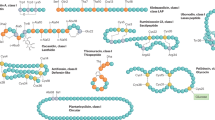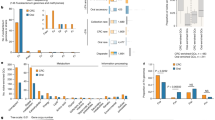Abstract
DURING work on the use of penicillin pastilles in oral infections, of which a preliminary report has been published1, numerous experiments have been undertaken in order to determine the total and differential fall in numbers of different species of bacteria in the mouth and the rate of this fall, under the influence of penicillin. This rate of fall is of particular interest, and as it appears that certain deductions on the mode of action of penicillin can be drawn from the experiments, it is considered that it is worth directing attention to them in a separate publication. The technique of determining the rate of fall was as follows:
This is a preview of subscription content, access via your institution
Access options
Subscribe to this journal
Receive 51 print issues and online access
$199.00 per year
only $3.90 per issue
Buy this article
- Purchase on Springer Link
- Instant access to full article PDF
Prices may be subject to local taxes which are calculated during checkout
Similar content being viewed by others
References
MacGregor and Long, Brit. Med. J., ii, 686 (1944).
Author information
Authors and Affiliations
Rights and permissions
About this article
Cite this article
MACGREGOR, A., LONG, D. Action of Penicillin on the Rate of Fall in Numbers of Bacteria in vivo. Nature 155, 201–202 (1945). https://doi.org/10.1038/155201a0
Issue Date:
DOI: https://doi.org/10.1038/155201a0
Comments
By submitting a comment you agree to abide by our Terms and Community Guidelines. If you find something abusive or that does not comply with our terms or guidelines please flag it as inappropriate.



